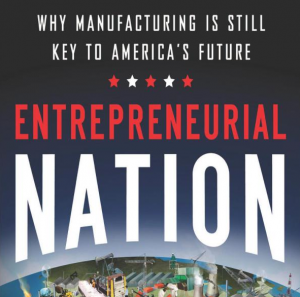Contrary to popular belief, America is still a world leader when it comes to manufacturing. We are neck and neck with China. Both nations account for about 20% of the world’s manufacturing output. We produce such an impressive output with about 10% of our economy; whereas, China uses nearly 40% of its GDP to match our manufacturing output. Our labor productivity is about six times that of China, giving us a competitive advantage.
In Entrepreneurial Nation, I profile 15 American manufacturers to make the case that our democratic culture accounts for our higher productivity compared to more authoritarian nations. Many of the manufacturers I profile have owners or employees who are tinkerers, who relish experimenting to improve a product’s design or to implement a new approach to production. What distinguishes them is not an academic knowledge of mathematics or engineering, though they are plenty smart. Rather, in addition to a grasp of theory, they have a practical sense of how to put things together and take them apart, and how to make products to address consumer needs.
The maker movement can help America continue to have an entrepreneurial workforce. For those not familiar, the maker movement is an organic effort in local communities throughout our country whereby individuals with an aptitude for making things meet at a conference or informal gathering to share ideas and display their work. The maker movement is critical to our manufacturing future for several reasons. First, it helps cultivate in a new generation an interest in manufacturing. We need young people to be as excited about entering manufacturing careers as becoming investment bankers, doctors, or consultants. Second, it fosters collaboration and the free exchange of ideas that leading thinkers, such as Larry Lessig, have argued is essential for innovation. Finally, it encourages our future manufacturing leaders to be creative. Manufacturing is about more than learning equations or doing well on tests. It requires a willingness to think out of the box and question conventional wisdom. The maker movement is challenging our workforce to be bold and push the boundaries of technological progress.
We will never be able to compete with China on price or size. China has cheaper labor and it graduates hundreds of thousands more engineers every year. So, what must America do to remain competitive in manufacturing? We need to constantly be moving up the value chain, making better products in a more cost-efficient way. A significant chunk of low-end manufacturing and mass production may go offshore. But, as I show in Entrepreneurial Nation, we can still make blenders, fire suits, steel, planes, batteries, construction equipment and many other products domestically if we economize, innovate, and customize.
To remain a manufacturing leader, almost every American worker, whether an owner, middle manager, or assembly line technician, must be entrepreneurial. The maker movement is helping foster precisely the type of entrepreneurialism that makes America exceptional. It is our bottom-up answer to the state-led manufacturing that defines China. Our competition with China is the modern analog of Athens versus Sparta. My bet is that American ingenuity will prevail.
 Ro Khanna is the author of Entrepreneurial Nation: Wny Manufacturing is Still Key To America’s Future. He was the Deputy Assistant Secretary of Commerce in the Obama Administration from 2009-2011. He is Of Counsel at Wilson Sonsini Goodrich & Rosati, a Silicon Valley based law firm, and is a Visiting Lecturer in the Department of Economics at Stanford University. His website is Ro Khanna
Ro Khanna is the author of Entrepreneurial Nation: Wny Manufacturing is Still Key To America’s Future. He was the Deputy Assistant Secretary of Commerce in the Obama Administration from 2009-2011. He is Of Counsel at Wilson Sonsini Goodrich & Rosati, a Silicon Valley based law firm, and is a Visiting Lecturer in the Department of Economics at Stanford University. His website is Ro Khanna









